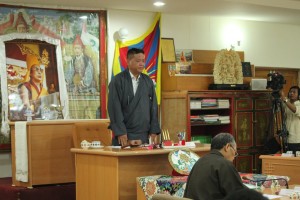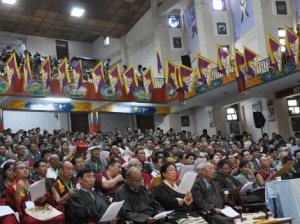This month the 15th Tibetan Parliament sat for its fourth session in Dharamsala. Its task was to review the work of cabinet (Kashag) departments and carry out legislative duties; however, the opening day was dedicated entirely to the worsening situation inside Tibet and to the Tibetans who have self-immolated demanding freedom and the return of His Holiness the Dalai Lama.
The Speaker of the Tibetan Parliament, Penpa Tsering, used his opening remarks to honor the sacrifices of the 51 Tibetans who have set themselves on fire since 2009. He added that the Chinese government has employed increasingly repressive measures and greater security clampdowns in Tibet, rather than addressing the grievances of the Tibetan people.
Mr. Penpa Tsering also spoke of the need for the Tibetan Parliament to preemptively avoid and obstruct the “baseless charges” that have been causing distress to His Holiness. Recently the Tibetan spiritual leader had expressed ‘hurt’ over ‘talks’ of his role in ‘shutting down’ the Central Tibetan Administration. These comments stem from the Dalai Lama’s decision last year to devolve all of his political powers to the elected Tibetan leadership.
“Instead of fulfilling their duties, a small group of Tibetans have engaged in making groundless claims to create discord in the community,” Speaker Tsering said. “By the virtue of its legislative authorities, the Tibetan Parliament had approved the final decision concerning the devolution of powers and thus the responsibility lies with the parliament to obstruct all causes of distress to His Holiness.”
Speaker Tsering also warned the Tibetan media against broadcasting anonymous content and comments under pseudonyms, which fuel social discord and denigrate the Dalai Lama. He stressed the shared responsibility of the Kashag, Parliament, and NGOs to provide clarification and form awareness on this matter.
During the Session, which lasted for eight working days from September 14-22, the Parliament-in-Exile unanimously adopted a resolution to the official title of the head of the Central Tibetan Administration (CTA) from ‘Kalon Tripa’ to ‘Sikyong.’ Whereas ‘Kalon Tripa’ translates into English as ‘Chief of Cabinet’, ‘Sikyong’ translates as ‘Political Leader.’
The amendment was introduced by Kalon Dhongchung Ngodup of the Security Department, who read from a recent speech given by His Holiness on his preference for the title ‘Sikyong.’ Kalon Ngodup also revealed that Tibetans inside Tibet have expressed strong sentiments in favor of the title.
Last year, His Holiness used the term in his congratulatory speech to the democratically elected leader of the Tibetan People, Dr. Lobsang Sangay.
“I took over the political leadership of Tibet from Sikyong Tagdrag Rinpoche when I was 16 years old. Today, in the 21st century, when democracy is thriving, I hand over the political leadership of Tibet to Sikyong Lobsang Sangay,” the Dalai Lama had said.
Discussions in the Parliament over the political, diplomatic, administrative, and historical need and repercussions of the title change remained minimal, with a large majority of the Tibetan parliamentarians and Kalons citing directly from His Holiness’ speeches. A few of the speakers requested that their colleagues not obstruct the bill considering it to be the Dalai Lama’s guidance.





 Print
Print Email
Email